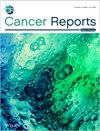Nutrition Security During Cancer: A Qualitative Investigation Among Patients With Cancer on Active Treatment From an Area of Persistent Poverty
Abstract
Objective
The objective of this paper was to qualitatively explore the eating habits and experience of nutrition security during cancer treatment among patients from an area of persistent poverty being treated in a safety net hospital oncology program.
Methods
Eleven in-depth interviews were conducted with current individuals with cancer who were (1) undergoing active cancer treatment at LBJ Hospital, (2) over 18 years old, (3) English speaking, and (4) residing in an Acres Homes zip code. Reflexive thematic analysis was undertaken by four members of the study team, which brought together diverse expertise in health disparities, nutrition, food culture, and health communication.
Results
Four main themes emerged from the data, including (1) food beliefs and eating behaviors in the context of cancer, (2) social and economic influences on food selection, procurement, and preparation, (3) lived experience of resiliency and coping with limited resources, and (4) the role of relationships (including social support, family, medical teams) in diet and food choice.
Conclusion
Findings from this study begin to fill a gap in knowledge regarding the complexities of managing nutritional needs among patients residing in an area of persistent poverty, which can inform the development of future health systems and community-based resources for those negotiating both cancer and chronically limited resources.

 求助内容:
求助内容: 应助结果提醒方式:
应助结果提醒方式:


